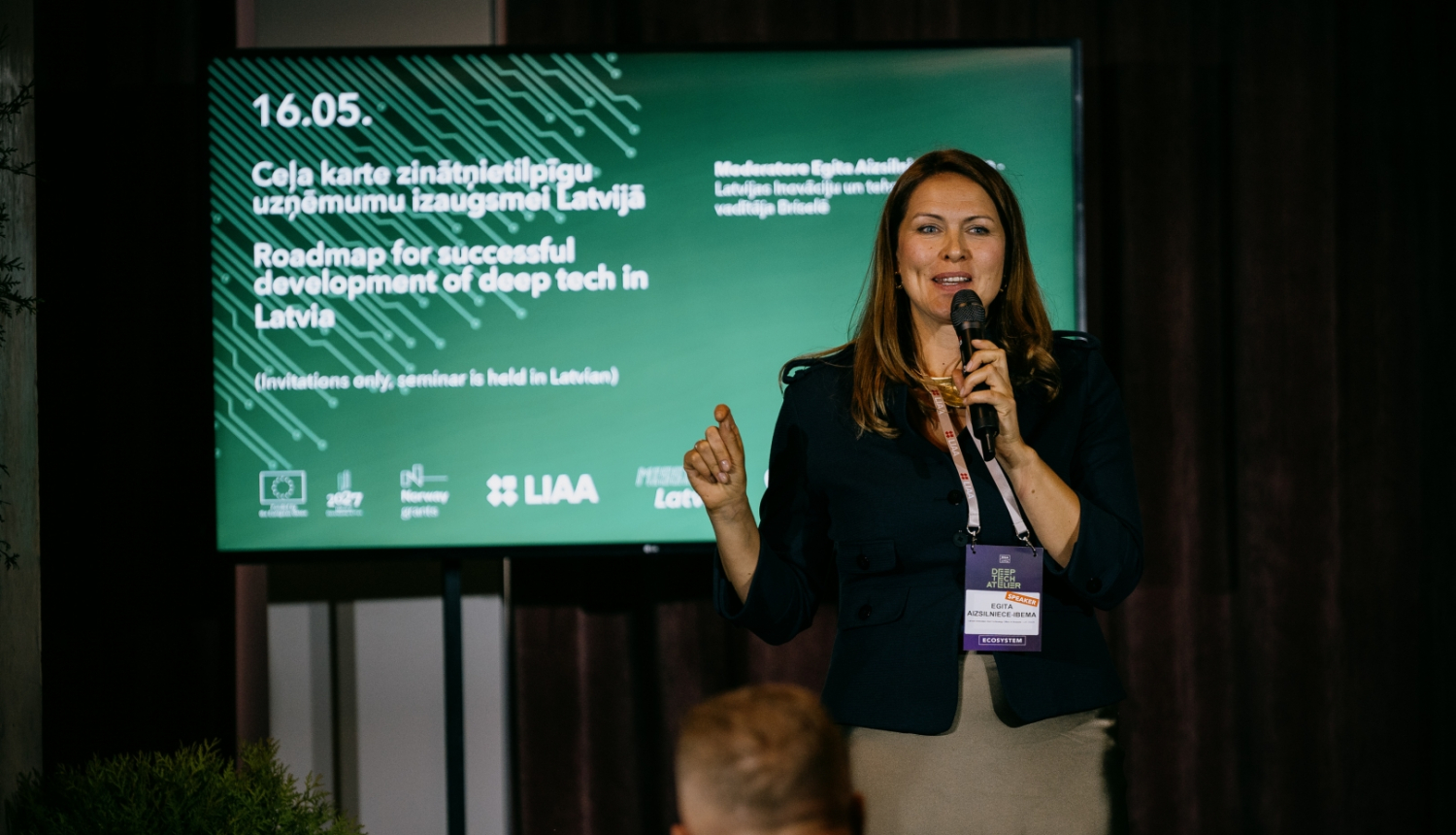Egita Aizsilniece-Ibema, Head of the Latvian Innovation and Technology Representation in Brussels
Latvia can be proud of its talented and intelligent individuals, both in science and business. The most courageous among them are enhancing the competitiveness of the technologies developed in our laboratories and identifying global markets for them. Naturally, these enterprising Latvian talents need a roadmap for the growth of science-intensive companies, and this roadmap is largely created by knowledgeable specialists from the state. With this in mind, we are compiling a list of investors and supporters of science-intensive companies, as well as ideas on how to better support technology development in the future. Moreover, it is not only the Latvian Investment and Development Agency (LIAA) that works to support science-intensive companies. At the "Deep Tech Atelier 2024" conference which was held in Latvia in May, we engaged all stakeholders – research organizations, industry experts, scientific startups, government representatives, technology enthusiasts, public and private investors – to understand each party's various opportunities and the essential elements to add to the roadmap.
Here, some key issues emerge: how can we ensure that the state supports the development of science-intensive technologies at every stage, from the initial test version created in the laboratory to the final product or technology tested in the business environment, achieving stable production and, ultimately, the anticipated profit?
Currently, there are several breaks in this development chain. The first break occurs when the development of certain technologies is supported by research grants from the Latvian Science Council. These programs are not connected with other support programs, raising the question of how this connection could be achieved?
The second costly stage for deep tech companies arises when the technology needs to be tested and improved in a real-world environment. Due to various obstacles in certain development phases, this process is longer and more complex compared to digital technologies, which undergo testing much faster. On top of that, in material science and engineering, the development stage during testing is more expensive, so support should be provided at a corresponding level. Thus, if support for material sciences has been relatively minimal, it is unrealistic to expect quick and competitively priced results.
In the final stage – growth – venture capital is also important for the rapid development of these future technologies.
LIAA is aware of many startups that have successfully found a common language with scientists and created new products that will contribute to the development of Latvia's economy. A good example is the Commercialization Reactor – a platform where new high-tech companies are born. Through the support program, business and science professionals come together to form teams. Since 2020, in cooperation with the Commercialization Reactor, 69 teams and 39 science-intensive startups have been created at the "Ignition Event" organized by LIAA as "Deep Tech Atelier" satellite events.
Serching Human Contact and Legal Forms
It is crucial for a human connection to be established among entrepreneurs and scientists, along with a shared commitment to collaboration. Sometimes intellectual property issues, which are not fully resolved in Latvia, pose challenges. This complicates the transfer of technology from research institutions and universities to the business sector. Simplifying this process is crucial to ensure mutual benefits, particularly for the laboratories responsible for pioneering new technologies. This entails addressing legislative concerns to determine who will ultimately profit from the product.
For science-based companies, intellectual property issues are a major challenge. To bring a new product to market, a company needs more than just a product license.
Intellectual property matters pose significant challenges for science-based enterprises. Launching a new product demands more than just acquiring a product license; it require access to laboratories, expertise, research capabilities, and more. On the other hand, a university should not inherently engage in science development. Therefore, it's imperative to establish legal clarity regarding ownership of intellectual property within each team member's contributions. Additionally, proper legal formatting from the outset is essential to instill investor confidence, ensuring that investments yield future benefits.
When entrepreneurs collaborate with scientists, the open question remains – who should be the one to patent the innovation? After all, the work was done together! Concerns are understandable and, under current legislative understanding, very relevant. The ongoing efforts of the Latvian Science Council are focused on refining regulations to ensure that the patenting process aligns with both local conditions and global best practices.
Especially worrying for companies are moments when a groundbreaking product is developed, but the process lags, and meanwhile, someone else creates similar innovation. At such moments, it might seem that all the effort has gone to waste. To ensure that the pioneers of new technologies claim the first-mover advantage in the global market, can quickly conduct testing, and start international trade, robust state support is indispensable. The speed at which a product is brought to market makes a big difference. Likewise, intellectual property protection is critically important to prevent unauthorized replication.
The Science-Intensive Entrepreneur is a Marathon Runner
It is understandable that entrepreneurs value the quickest possible patent registration, and we have tried to apply state support to compensate for these process costs. Seminars are organized to explain the patent registration process and its support opportunities to entrepreneurs.
A science-intensive entrepreneur is essentially a marathon runner, as developing a science-intensive technology and bringing it to a sold product can take 7-10 years on average. Endurance is crucial, as many processes occur simultaneously. For instance, they must be able to write applications for multiple support programs at once. Historically, engineering sciences have been very well developed in Latvia, with universities having formed separate ecosystems over the years. We have grown large science-intensive companies that can share their experiences. For example, six years ago, TET invested in a new artificial intelligence (AI) technology and is now starting to making a profit. At that time, TET management’s investment in AI was a bold guess, but it turned out to be successful and correct in today’s situation, allowing the company to offer highly demanded and non-existent functionalities in the market.
European Union (EU) co-financing is more substantial, and national support is available to a lesser extent. Unfortunately, the reality is that grant applicants must hear many rejections before receiving a “Yes.” This must be endured, and as specialists, we can help, but the biggest work is in their hands. If the company "Naco Technologies" receives a €2.3 million grant from the European Innovation Council’s “EIC Accelerator” program for producing a unique coating for hydrogen technology, it allows the company to attract private investments necessary for expanding the production of a currently non-existent product in the market. Similarly, the biotechnology startup "Cellbox Labs" has attracted a €935,000 pre-seed investment – a very good example that Latvian investors can unite and invest together in strong future technology.
It is commendable that an investor group has formed in Latvia, willing to invest in “Deep Tech,” ready to take risks and invest in science-intensive companies. The environment for such companies’ development in Latvia is fertile and needs to be supported. This can be achieved by organizing regulatory acts, providing sufficient state support, and reducing administrative burdens. The availability and development of talents who can work in this field and create a highly developed Latvian economy are equally important.
Stability in the National Tax System is Also Important for Startups
What hinders the collaboration between science and business? It is observed that with Latvia’s resources, we have enough for start-up capital, but a “Deep Tech” company requires extremely large investments. It is progressive to look broader and attract foreign funding, seeking new contacts beyond Latvia’s borders. Up to a certain level of company development, internal competition is sufficient with Latvian support, but to continue developing, the biggest challenge for science-intensive companies is attracting international support. Other companies purposefully create chains in various countries, and naturally, we are interested in this happening within the EU. Venture capital must be available in Latvia at a stage where the company is ready to create a pilot factory, but significant classic successful company parameters (turnover, export volume, etc.) have not yet been achieved.
In fields where we have strong talents in laboratories, companies are still distinctly based in Latvia. If we talk about hydrogen, quantum, photonics, water purification, etc., technologies, they are not meant for sale in stores but are driven by a B2B model. LIAA’s role is to interest large companies in collaborating with these technology startups. The competence of the laboratory locations depends on where a non-existent technology can be implemented and observed further.
It is understood that it is challenging for startup teams to orient themselves in everything, so LIAA helps within its possibilities. It is definitely worth following information about upcoming forums, researching, listening to relevant seminars, being active, seeking support, finding a common language with a mentor, applying for the “Startup School” training program, using spaces intended for startups like “Startup House Riga,” communicating with LIAA in Riga and its regional representations. In May, applications for the incubation program at the Technology Representation in Riga for companies developing science-intensive products or services in one of the smart specialization sectors closed – companies will receive financial and non-financial support to develop their business ideas.
Technology startups must realize that support is extremely widely available both in the EU and even beyond, but starting is possible with something more manageable right here in Latvia. Perhaps a voucher for collaboration with Latvian laboratories will be useful for a startup, or perhaps another support program. For example, applications for technology development support programs are currently being accepted, and maybe your team will be one of the 10 teams that can push their technology forward. Entrepreneurs and scientists must believe in the power of joining forces; after all, Latvian startups are even in space. No matter how small our entrepreneurs’ steps may seem, we believe that by asking and receiving the necessary expert answers, information not only in Latvia but also in LIAA’s Innovation and Technology representations in Brussels, Geneva, and Tel Aviv, they will become significant for humanity over time.
The funding for the conference Deep Tech Atelier is provided from the ERDF projects "Development of Innovative Entrepreneurship of SMEs" and "Support for the Improvement of Technology Transfer System," the Norwegian Financial Mechanism 2014-2021 program "Enterprise Development, Innovation, and SMEs," and the state budget program 28.00.00. Funds for the Implementation of Foreign Economic Policy State Image.




